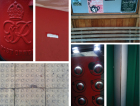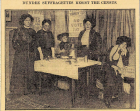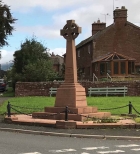Local Study
The importance of local history for developing a sense of place and identity is emphasised by the National Curriculum. The local landscape and buildings can often reveal a great deal about the use of land and the type of people who lived there in the past. Buildings and landscape can reveal how long a heritage the place has had. Monuments and local heritage or parish records can highlight individual local heroes or provide a window into the lives of ordinary local people in times gone by. How similar or different were their lives? Often, the local picture can also help to reveal the national or international picture.
Sort by:
Date (Newest first) | Title A-Z
Show:
All |
Articles |
Podcasts |
Multipage Articles
-

School war memorials as the subject for enquiry-based learning
ArticleClick to view -

What’s in a road? Local history at Early Years and Key Stage 1
ArticleClick to view -

One of my favourite history places: Kirkstall Abbey, Leeds
ArticleClick to view -

How can we make effective use of the census in the primary history classroom?
ArticleClick to view -

Exploring empire, artefacts and local history
ArticleClick to view -

Using trade directories: reconstructing life 100 years ago
ArticleClick to view -

One of my favourite history places: the West Riding Pauper Lunatic Asylum
ArticleClick to view -

Exploring the Rollright Stones as part of your Stone Age to Iron Age study
ArticleClick to view -

How to make a toy museum
ArticleClick to view -

Census 2021: using the census in the history classroom
ArticleClick to view -

Belmont’s evacuee children: a local history project
ArticleClick to view -

Take one day: undertaking an in-depth local enquiry
ArticleClick to view -

All the fun of the fair! Key Stage 1 – Beyond living memory
ArticleClick to view -

One of my favourite history places: Conwy
ArticleClick to view -

Insights from a year of leading the development of a ‘knowledge-rich curriculum’
ArticleClick to view -

Using a house for your local history study
ArticleClick to view -

One of my favourite history places: Glastonbury
ArticleClick to view -

Teaching local history through a family
ArticleClick to view -

Using the back cover image: Lest We Forget
ArticleClick to view -

One of my favourite history places: Durham Cathedral
ArticleClick to view


